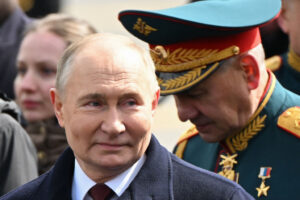Since Russia’s invasion of Ukraine, the foreign policy of Georgia’s ruling party has been nothing short of schizophrenic. For years, Georgian Dream has been flirting with both the European Union and paradoxically with Moscow, Georgia’s age-old enemy which invaded the country in 2008 and still occupies 20% of its territory. But in light of the deep geopolitical cleavages that have emerged since 2022, such a delicate balancing act was always bound to fail.
At times, Georgia has appeared committed to closer ties with the EU. In December 2022, along with Azerbaijan and EU members Romania and Hungary, it signed a momentous deal to build an electric cable running 1,200km under the Black Sea as part of a project that would reduce the EU’s reliance on Russian oil and gas. A year later, in December 2023, Georgia was granted candidate status by the EU, which then-Prime Minister Irakli Garibashvili, a member of Georgian Dream, hailed as a “historic victory”.
Yet despite its ever-closer ties with Europe, Georgian Dream, whose party chairman is a Georgian oligarch is closely linked to Russia, has simultaneously been soft on Moscow since the war broke out. In February 2022, it refused to join Europe in imposing sanctions on Russia when it invaded Ukraine. Georgia went on to become a key conduit for Russia-bound goods, playing a crucial part in helping Russia’s economy weather Western sanctions. It welcomed Russia’s suspension of a flight ban to Georgia in 2023, and repeatedly accused the West of trying to draw it into the war in Ukraine.
Now, Georgia Dream appears to have made its final choice. Last Tuesday, after weeks of some of the largest protests Tbilisi has ever seen, the party passed a highly controversial foreign agents law, under which any NGOs or media outlets receiving more than 20% of their funding from overseas would have to register as “organisations serving the interests of a foreign power”. The law would effectively force certain political groups opposed to Georgian Dream to register as foreign agents or face large fines, and although Georgian Dream has maintained the law is about transparency, its leaders have already suggested it would be used to shield Georgia from Western liberal values. The vote was preceded by a brawl in Parliament; afterwards, raging protestors besieged the building.
Protesters have compared the law to Russian legislation used by the Kremlin to punish dissenters and force opposition non-profits to close. Many fear it will be used to the same ends in Georgia. But according to Inal Khashig, a journalist and political commentator from Abkhazia, one of the two Georgian regions under Russian occupation, it is what the law symbolises that is most concerning: “Few people understand, but the Law on Foreign Agents has a certain sacred meaning for the Kremlin,” Khashig wrote on Telegram. “This is a kind of oath of allegiance. Something like Kipling’s ‘you and I are of the same blood’.”
If the law stands, and Georgian Dream escalates its crackdown on protestors using state-backed campaigns of intimidation, police violence, and armed thugs it has already unleashed on crowds over the last few weeks, Georgia will end up ostracised by Europe and the US and find itself steadily pulled back into Moscow’s orbit. This scenario risks threatening not only Georgia, but the whole of Europe, disturbing security and trade across Eurasia as well as EU energy politics and even the war in Ukraine.
The consequences would be no less dramatic if Georgian Dream were to capitulate and rescind the law. Without such a powerful cudgel, the party would probably lose power in Georgia’s parliamentary elections in October, pathing the way for a full-scale westward tilt and eventually EU and perhaps even Nato membership. From the Kremlin’s perspective, this would be almost as serious as Ukraine joining the alliance.
The stakes of Georgia’s protests could hardly be higher, and will almost certainly cause ripple effects across the Black Sea region, which, since February 2022, has become a major and violent theatre of the war in Ukraine. Nearly from its start, Russia’s war in Ukraine has hampered its ability to project power in the Black Sea. By late 2022, Russia’s Black Sea fleet had been assailed by Ukrainian missiles and drones, while its vulnerable Kerch Strait Bridge, the only connection between occupied Crimea and mainland Russia, was constantly under assault.
Moscow found itself increasingly vulnerable in a Black Sea region surrounded by hostile Nato and Nato-allied states — with the exception of Georgia and a stretch of occupied Ukrainian coastline. It soon deemed its long-time naval base in Sevastopol, Crimea to be too exposed to Ukrainian attacks to house its Black Sea fleet, and in late 2023, it announced the construction of a new base on the coast of occupied Abkhazia, just 30km from the border of Georgian-controlled territory. Georgian Dream was in no position to meaningfully oppose the move, and despite all its talk of the West trying to drag Georgia into the war in Ukraine, it was Russia that was seemingly bringing the war to Georgia’s doorstep. Since the base’s announcement, Ukrainian President Volodymyr Zelensky has made no secret of the fact that the Ukrainian military would continue to target the Russian navy even in Abkhazia.
With few good alternatives, Russia would happily take advantage of a solidly Russia-aligned Georgia to strengthen its position along the Black Sea, potentially even building naval and air bases on sovereign Georgian territory. This could broaden the war into the eastern reaches of the Black Sea and Georgia itself.
Georgia is not only an appealing ally from a military perspective, but also from an economic one. It lies at the heart of the Middle Corridor, a group of trade routes that connect Central Asia to Europe via the Caspian Sea and the South Caucasus, whose potential is only beginning to become apparent. As Russia has been cut off from Western trade networks and maritime trade through the Red Sea has plummeted following the Houthis’ attacks of cargo ships, the Middle Corridor has grown increasingly attractive — not only does it bypass both problem areas, but planned railway modernisations will make it markedly faster than either of the two other routes in the next three years. It’s one of many reasons why the West wants to keep Georgia in its camp.
Another is the new Black Sea submarine cable. In order to limit its dependence on Russian fossil fuels, the EU has embraced Azerbaijan and its abundant Caspian oil and gas reserves and the cable intended to transport Azeri energy to Europe would have to run through Georgia. According to European Commission President Ursula von der Leyen, not only would these new energy sources be used to enhance access to power in the Western Balkans and Moldova, both arenas in the West’s war of influence with Russia, but they could also aid the future reconstruction of Ukraine’s war-damaged energy infrastructure.
Both the Middle Corridor and the Black Sea cable project depend on Georgia remaining free from Russian domination. If, however, Georgia capitulates to Moscow, it could become a pariah in the eyes of the West and find itself chased out of the American-led economic market, nullifying the appeal of both the Middle Corridor and the cable. European energy deals with Azerbaijan would suddenly be imperiled, threatening the last decent option the continent had to maintain its energy needs, while EU trade with Central and East Asia would become more arduous and expensive than ever. Only Russia would stand to gain, as it would effectively exercise control over every significant overland trade route from Asia to Europe.
Yet Russia has stayed relatively quiet in recent weeks. Although Kremlin spokesman Dmitry Peskov has vocally supported Georgian Dream’s effort to pass the foreign agent law and expressed Russia’s interest in a “stable and predictable” Georgia, he has scoffed at the suggestion that the law has anything to do with Russia. So long as Georgian Dream stays the course and incorporates Georgia back into the Russkiy mir, the Russian world, Moscow has few reasons to devote much attention to it at a time while its focus is on Ukraine.
That would, however, change dramatically if Georgia were to gaze westward again. An EU-aspiring Georgia that might eventually join Nato would necessitate a wholesale reorientation of Russian forces in its south. This would be particularly significant because forces in the Caucasus region near Georgia are under the command of Russia’s Southern Military District, which is also tasked with maintaining the occupation of Crimea and southeastern Ukraine. With potential Nato troops on its southern doorstep, the Southern Military District would be stretched to its limit and Russian forces would be spread thin at a time when they can least afford it.
But Georgia’s destiny is also highly symbolic. Having emerged as a promising young democracy, Georgia’s transformation into a Russian puppet state would be a devastating loss for the cause of global freedom. The good news, however, is that in Georgia, popular protests have historically had power — a similar wave of dissent forced Georgian Dream to withdraw the same foreign agent law in 2023. Now that the law has been passed, the task before the Georgian people is a far more difficult one. Any protestor in Tbilisi will tell you that they are fighting for the survival of their nation — but the truth is that riding on their shoulders is the fate of millions of others across the Eurasian heartland.
Disclaimer
Some of the posts we share are controversial and we do not necessarily agree with them in the whole extend. Sometimes we agree with the content or part of it but we do not agree with the narration or language. Nevertheless we find them somehow interesting, valuable and/or informative or we share them, because we strongly believe in freedom of speech, free press and journalism. We strongly encourage you to have a critical approach to all the content, do your own research and analysis to build your own opinion.
We would be glad to have your feedback.
Source: UnHerd Read the original article here: https://unherd.com/



